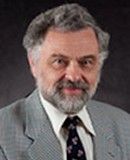Plenary Lecture
Robust Computation in Geometry and Engineering

Professor Václav Skala
Fellow of the Eurographics Association
Center of Computer Graphics and Visualization
Department of Computer Science and Engineering
Faculty of Applied Sciences
University of West Bohemia
Univerzitni 8
CZ 206 14 Plzen, Czech Republic
E-mail: skala@kiv.zcu.cz
-also with-
Department of Computer Science
Faculty of Electrical Engineering and Computer Science
VSB-Technical University of Ostrava
17.listopadu 15/2172
CZ 708 33 Ostrava-Poruba, Czech Republic
E-mail: vaclav.skala@vsb.cz
Abstract: Development of new algorithms is a crucial part not only in research, but it is needed in Engineering applications, namely in all computational fields, Computer Graphics, Visualization and Computer Vision fields.
Understanding of projective geometry and the principle of duality enable to understand the substance of the solved problem as the problem can be transformed to a dual space, where the solution is simple and/or helps to develop new algorithms.
Projective geometry notation and use can be used in computational problems and in many cases helps to speed up computation. Especially if the matrix-vector architecture like GPU is used, the reformulation of the problem using projective notation increases the speed of computation.
The principles will be demonstrated on simple examples. Examples of computational problems, disasters caused by numerical computations will be presented as well.
• Typical engineering and geometrical problems
• Euclidean and projective spaces, transformations, properties
• Duality (linear), property of dual transformation, dual problems
• Algorithm complexity – simple geometrical examples – and dual problems
• How dual formulation can influence development of a new method, algorithm
• Robustness and influence to algorithm design
• Typical examples how projective/dual formulation can speed up computation
• How projective formulation supports algorithms for GPU architecture
• Typical examples of geometrical problems, their projective reformulation leading to significant speed up and in some cases to reconsideration leading to lower algorithm complexity
Brief Biography of the Speaker: Prof. Vaclav Skala is a Full professor of Computer Science at the University of West Bohemia, Plzen and VSB-Technical University Ostrava, Czech Republic. He received his ING.(equivalent of MSc.) degree in 1975 from the Institute of Technology in Plzen and CSc. (equivalent of Ph.D.) degree from the Czech Technical University in Prague in 1981. In 1996 he became a full professor in Computer Science. In 1997 the Center of Computer Graphics and Visualization (CCGV) was formally established and since then he is the Head of the CCGV in Plzen.
Prof.Vaclav Skala is an associate editor of The Visual Computer (Springer), Computers and Graphics (Elsevier), member of the Editorial Board fo Machine Graphics and Vision (Polish Academy of Sciences) and the Editor in Chief of the Journal of WSCG. He is a member of international program committees of prestigious conferences and workshops. He is a member of ACM SIGGRAPH, IEEE and Eurographics Association.
Prof.Vaclav Skala has published over 200 research papers at conferences and research journals. His current research interests are computer graphics and visualization, mathematics, especially geometrical algebra, algorithms and data structures.